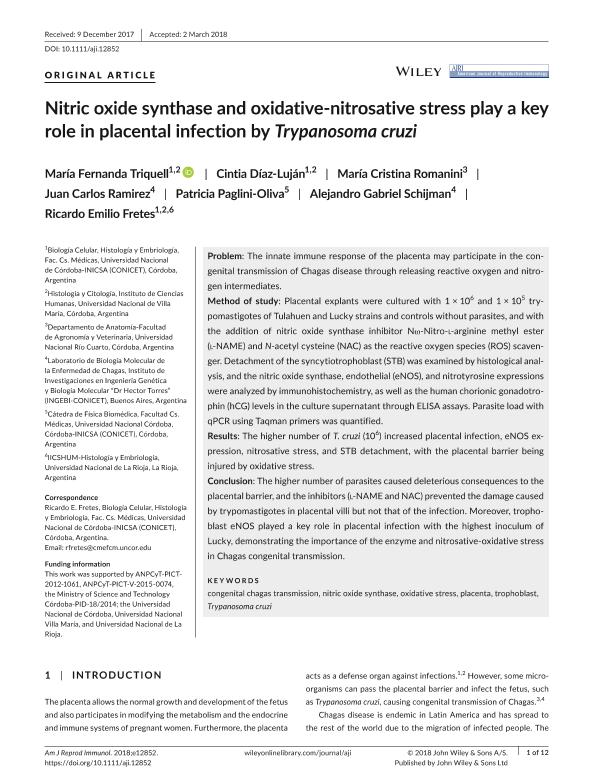Artículo
Nitric oxide synthase and oxidative-nitrosative stress play a key role in placental infection by Trypanosoma cruzi
Triquell, María Fernanda; Díaz Luján, Cintia María; Romanini, María Cristina; Ramirez Gomez, Juan Carlos ; Paglini, Patricia Adriana; Schijman, Alejandro Gabriel
; Paglini, Patricia Adriana; Schijman, Alejandro Gabriel ; Fretes, Ricardo Emilio
; Fretes, Ricardo Emilio
 ; Paglini, Patricia Adriana; Schijman, Alejandro Gabriel
; Paglini, Patricia Adriana; Schijman, Alejandro Gabriel ; Fretes, Ricardo Emilio
; Fretes, Ricardo Emilio
Fecha de publicación:
07/2018
Editorial:
Wiley Blackwell Publishing, Inc
Revista:
American Journal of Reproductive Immunology
ISSN:
1046-7408
Idioma:
Inglés
Tipo de recurso:
Artículo publicado
Clasificación temática:
Resumen
Problem: The innate immune response of the placenta may participate in the congenital transmission of Chagas disease through releasing reactive oxygen and nitrogen intermediates. Method of study: Placental explants were cultured with 1 × 106 and 1 × 105 trypomastigotes of Tulahuen and Lucky strains and controls without parasites, and with the addition of nitric oxide synthase inhibitor Nω-Nitro-l-arginine methyl ester (l-NAME) and N-acetyl cysteine (NAC) as the reactive oxygen species (ROS) scavenger. Detachment of the syncytiotrophoblast (STB) was examined by histological analysis, and the nitric oxide synthase, endothelial (eNOS), and nitrotyrosine expressions were analyzed by immunohistochemistry, as well as the human chorionic gonadotrophin (hCG) levels in the culture supernatant through ELISA assays. Parasite load with qPCR using Taqman primers was quantified. Results: The higher number of T. cruzi (106) increased placental infection, eNOS expression, nitrosative stress, and STB detachment, with the placental barrier being injured by oxidative stress. Conclusion: The higher number of parasites caused deleterious consequences to the placental barrier, and the inhibitors (l-NAME and NAC) prevented the damage caused by trypomastigotes in placental villi but not that of the infection. Moreover, trophoblast eNOS played a key role in placental infection with the highest inoculum of Lucky, demonstrating the importance of the enzyme and nitrosative-oxidative stress in Chagas congenital transmission.
Archivos asociados
Licencia
Identificadores
Colecciones
Articulos(INGEBI)
Articulos de INST.DE INVEST.EN ING.GENETICA Y BIOL.MOLECULAR "DR. HECTOR N TORRES"
Articulos de INST.DE INVEST.EN ING.GENETICA Y BIOL.MOLECULAR "DR. HECTOR N TORRES"
Citación
Triquell, María Fernanda; Díaz Luján, Cintia María; Romanini, María Cristina; Ramirez Gomez, Juan Carlos; Paglini, Patricia Adriana; et al.; Nitric oxide synthase and oxidative-nitrosative stress play a key role in placental infection by Trypanosoma cruzi; Wiley Blackwell Publishing, Inc; American Journal of Reproductive Immunology; 80; 1; 7-2018; 1-12
Compartir
Altmétricas



